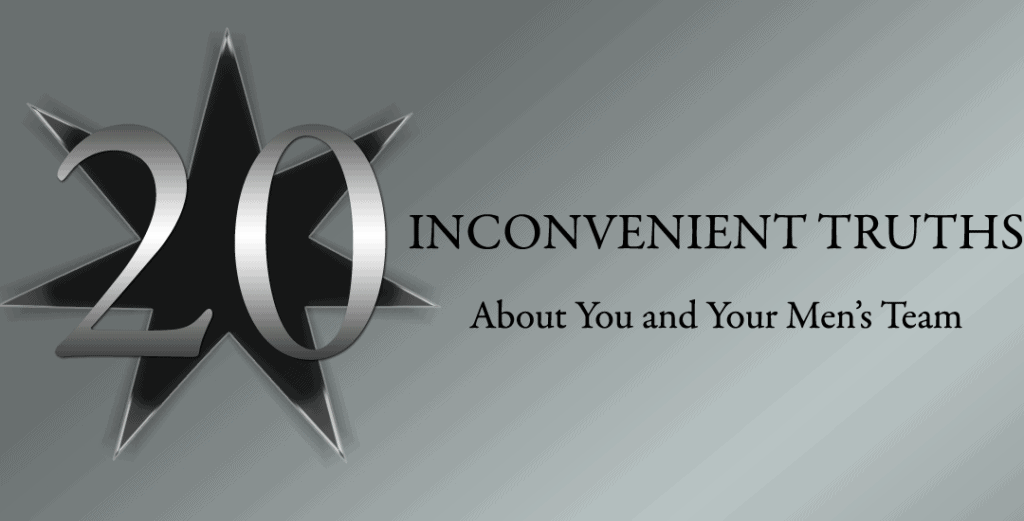Jim Ellis Legacy Magazine Editor
Is this an April Fools’ gag? How can these truism actually be true for our teams? If you are a teammate on an MDI men’s team, you can decide if these are true for you and your team … or not. Even if you are on some other form of team in your life, check it out. And check your gut.
- Your team is either growing or dying. Look around at the age of the men on your team. Father time has a way of fathering the world, doesn’t it? And it doesn’t matter people’s feelings on the matter. Yes, you will die. Left to its own device, your team will be history once the men move along, whether that be due to location change, job change, logistics, lack of interest or even death. Your team will die out unless you have the concept of growth or expansion in your mind and in your actions.
- We are all we’ve got. Once again, look around the circle you have. That’s it. You and your teammates ARE the team. It’s not like a professional football or baseball team that is owned and operated by some for-profit business. There is no higher-up league owner who will be trading for new players or bringing additional players onto the squad. No off-season draft picks coming on board. There is no salary cap with which to be concerned, no contracts. Sure, your team may dissolve and you may be placed on another team, however the level of success or failure for your team is what your teammates and you make of it.
- A meeting is only comprised of what the team players contribute. Everyone gives to the collective unit … or not. Whatever content is contributed by you and your men construct a team meeting. Sounds simplistic huh? But men may forget this fact when they hold back, don’t show up or choose not to contribute believing some crazy idea that it’s someone else’s job. There is no one else.
- The instant you point fingers at your team in blame, you are off the team. The very act of pointing towards another object immediately separates you from it. Again, here comes that pesky logic thing. Can you imagine looking at your family and saying “This family is terrible!” No, you wouldn’t do that since you are a member of said family. If you say, “This team is terrible” you are either talking about yourself, or you have already quit.
- Men let team leaders do it alone. Once a team leader is chosen, the rest of the teammates secretly think: “I’m so glad it isn’t me” and then choose to let the man flounder, as he must shoulder the job on his own. They will await (or avoid) the team leader’s call, rather than proactively owning the success of the team leader with a reach out to him: “Hey, is there anything I can do for you and the team?”
- Men want to let other men off the hook. Men look the other way when another man breaks his word rather than call him out on it. You look the other away at dishonorable behavior since you want to get away with the same. We are not a circle of honor truly, but rather an organization that is still learning the fine nuances of an art form lost long ago.
- You would rather be liked than respected. You don’t want to ruffle feathers or be disliked by your brother, so you hold back from telling him the truth, and let him slide on even the most basic tenants of the code. Your choice costs you your own power, a ton of respect, and on some level … your brother.
- You’d rather look good than be revealing. Revealing the deepest truth takes an intense amount of trust, rawness and authenticity. You’re not there.
- Your cleanups and consequences are weak and incomplete. The 10 pushups you do to come back into honor do not reflect how harsh life’s consequences can be if you continue with your unconscious behavior. As well, the “cleanups” no longer give back to anyone who has been impacted by the behavior, but rather it only considers a man coming back into his own honor. Simply, we have gone from: “What do you need from me so we can be OK,” to “What can you give me so I am OK?” Breaking a word or a standard can impact another man or other men. If you do nothing for them, to make up for that gap created by your oversight, you have not cleaned up anything.
- You don’t want to truly be held accountable. You want to get by doing the minimum. Your lowering of standards was something you have wanted all along. You secretly (and not so secretly) want a life of ease. Men, without conscience or a deep connection to their honor, have very low interest in restoring themselves, choosing not to voluntarily clean up a breech, but opting to allow themselves to slide or, if called out, shoot back in defense. You can break your word and it doesn’t matter to you because you are either unconscious or you don’t give a shit. How many men have made the motion: “I broke my word and it impacted you, so what can I do to make it up to you?” You don’t proactively clean up some err immediately but rather hope your broken word goes unnoticed … just like the hiders who break a dish in the kitchen and just leave it there, or the fart man who sniffs the air, and looks around with a quizzical look.
- You mostly show up as an individual at the individual level and not a teammate living at a team level. Your initiation event and point program sense of “unity” slips away swiftly. You merely validate your individual ego with the statements “I’m not getting what I need” or “I don’t like division meetings because I don’t get anything from them.” Such a low level of mind is blatantly evident when compared with a higher sentiment of “What can I offer this meeting for the good of all?” and “What can I do so everyone gets what they need?”
- Your desire to be absent from a team event because you aren’t “getting anything” demonstrates the passive, selfish fuck you’ve always been. It also foreshadows the man you will be once it’s time to leave … not just this team, or the organization, but this world.
- The longer you are in the division, the more you hide behind the “wisdom” you have gained. This is designed by your elitist mask in order to conceal the underbelly of what is really going on with you.
- The veteran men who leave are the ones who have bullshitted so much they make their own presence meaningless with their own facade. Bored out of their minds by their own fakeness, they have to go.
- The men who leave have little consciousness about what they leave behind, like an absent father who leaves a family without one moment of reflecting back. Their departure has everything to do with why they leave and where they are going, without a consideration of what they are leaving and how to honor where they have been.
- The underlying reason you can miss a team meeting without a second thought about your teammates or leave a division without looking back is because of the pervading belief that your own presence does not matter … hence you do not matter. And on a larger level it’s this belief within men – “I don’t matter” – which has helped to create a culture of deadbeat dad, absentee fatherhood and a legal system that removes fathers from families.
- The men who don’t admit to needing acknowledgement and help will end up as cranky old men. Many pretend they only give without a need for anything in return, without any need for a pat on the back. These overly proud men, towards the end of their lives, end up in a living assisted home, cranky, yelling for their supper, muttering something about not getting what they need.
- If you or your team is not fighting a good fight to overcome some obstacle towards a higher purpose, you all will start to argue with yourselves. Men will battle one way or another. It’s either for a higher vision or with each other.
- You need to have an unconditional trust of your men to get the most out of your team. Without risk there is no hurt. Without risk there is no glory. Trusting the men may not be natural to our lizard brains, but it’s necessary for the success of your team, your organization and our future generations.
- You secretly hate any of the above that reflects the truth, but you are too scared or lazy to do something about it.
A final word.
Depending on your own team and experience, this can all be wrong!
But if you were upset reading these words, there would be a reason for that.
If it makes you upset because it accurately depicts your team or division, then go out and do something to make it different.
If it makes you upset because it’s wrong about you and your team, then you have some teaching and mentoring to do.
James Anthony Ellis is an award-winning playwright, journalist and filmmaker, who is the author of eight books, including the men-focused “The Honor Book” available HERE.



Poignant…insightful… damn convicting!
Great job Ellis…
Brings to mind Jack Nicholson. “You can’t handle the truth.
#16 could be a book. And I’ve got a feeling, it will be. jae
Well written Mr. Ellis. It helps me both understand and generate the real value of my team in my life.